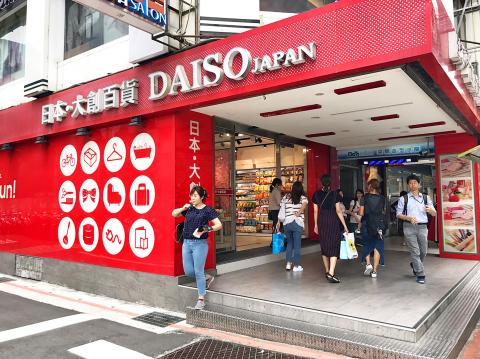Japanese discount store chain Daiso Industries Co has been banned from importing any goods to Taiwan for two years as a penalty for altering transaction dates to obtain an import permit, the Ministry of Economic Affairs said yesterday.
The ministry has revoked the company’s import permit and fined it NT$41.64 million (US$1.39 million) , Bureau of Foreign Trade Deputy Director-General Lee Guann-jyh (李冠志) told the Legislative Yuan in Taipei.
The ministry has also notified the Customs Administration of the ban, as some products imported by the company might have entered the market, he added.

Photo: CNA
Lee’s remarks came after New Power Party Executive Chairman Huang Kuo-chang (黃國昌) last month accused the ministry of turning a blind eye to Daiso, which allegedly imported goods from Japan during a six-month import suspension period in 2015.
The government has tightened the regulations on imports of food and high-risk products from Japan after the Fukushima Dai-ichi nuclear power plant disaster in March 2011.
Daiso was in 2015 prohibited from importing any products into Taiwan after it was found to have illegally import food products from the five Japanese prefectures from which food imports were banned.
The Foreign Trade Act (貿易法) stipulates that companies may import or export goods during a suspension period if the transactions had been established before the punishment was issued, according to.
However, most of Daiso’s goods imported to Taiwan during the suspension period were ordered after the punishment had been imposed, Huang said.
Daiso denied the accusations, but a statement on its Web site said that its management team had made a wrong decision to switch the dates in a bid to obtain approval from the government.
The Japanese budget store chain, which sells more than 20,000 items, operates about 60 stores in Taiwan, company data showed.

Taiwan Semiconductor Manufacturing Co (TSMC, 台積電) secured a record 70.2 percent share of the global foundry business in the second quarter, up from 67.6 percent the previous quarter, and continued widening its lead over second-placed Samsung Electronics Co, TrendForce Corp (集邦科技) said on Monday. TSMC posted US$30.24 billion in sales in the April-to-June period, up 18.5 percent from the previous quarter, driven by major smartphone customers entering their ramp-up cycle and robust demand for artificial intelligence chips, laptops and PCs, which boosted wafer shipments and average selling prices, TrendForce said in a report. Samsung’s sales also grew in the second quarter, up

LIMITED IMPACT: Investor confidence was likely sustained by its relatively small exposure to the Chinese market, as only less advanced chips are made in Nanjing Taiwan Semiconductor Manufacturing Co (TSMC, 台積電) saw its stock price close steady yesterday in a sign that the loss of the validated end user (VEU) status for its Nanjing, China, fab should have a mild impact on the world’s biggest contract chipmaker financially and technologically. Media reports about the waiver loss sent TSMC down 1.29 percent during the early trading session yesterday, but the stock soon regained strength and ended at NT$1,160, unchanged from Tuesday. Investors’ confidence in TSMC was likely built on its relatively small exposure to the Chinese market, as Chinese customers contributed about 9 percent to TSMC’s revenue last

LOOPHOLES: The move is to end a break that was aiding foreign producers without any similar benefit for US manufacturers, the US Department of Commerce said US President Donald Trump’s administration would make it harder for Samsung Electronics Co and SK Hynix Inc to ship critical equipment to their chipmaking operations in China, dealing a potential blow to the companies’ production in the world’s largest semiconductor market. The US Department of Commerce in a notice published on Friday said that it was revoking waivers for Samsung and SK Hynix to use US technologies in their Chinese operations. The companies had been operating in China under regulations that allow them to import chipmaking equipment without applying for a new license each time. The move would revise what is known

UNCERTAINTY: A final ruling against the president’s tariffs would upend his trade deals and force the government to content with billions of dollars in refunds The legal fight over US President Donald Trump’s global tariffs is deepening after a federal appeals court ruled the levies were issued illegally under an emergency law, extending the chaos in global trade. A 7-4 decision by a panel of judges on Friday was a major setback for Trump, even as it gives both sides something to boast about. The majority upheld a May ruling by the Court of International Trade that the tariffs were illegal. However, the judges left the levies intact while the case proceeds, as Trump had requested, and suggested that any injunction could potentially be narrowed to apply